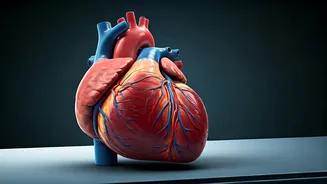Dietary Adjustments Crucial
One of the most effective strategies involves careful consideration of dietary choices. Focusing on foods that support cardiovascular health is vital.
The emphasis should be on limiting the intake of processed foods high in sodium, saturated, and trans fats, which are known to negatively impact heart health. Instead, include an abundance of fruits, vegetables, whole grains, and lean proteins in your diet. These food groups are rich in essential nutrients, fiber, and antioxidants that help reduce inflammation, lower cholesterol levels, and maintain healthy blood pressure. The inclusion of foods rich in omega-3 fatty acids, like salmon and flaxseeds, is highly encouraged. Moreover, controlling portion sizes and practicing mindful eating habits are crucial. Avoid overeating and be attentive to hunger and fullness cues. Dietary changes are not a quick fix but a sustainable lifestyle shift.
Regular Physical Activity
Regular physical activity is another critical element in preventing heart attacks. Exercise strengthens the cardiovascular system, making it more efficient at pumping blood and delivering oxygen throughout the body. Aim for at least 150 minutes of moderate-intensity exercise or 75 minutes of vigorous-intensity exercise per week. Moderate activities include brisk walking, cycling, and swimming, while vigorous activities involve running or high-intensity interval training (HIIT). Incorporating a variety of exercises is beneficial. Combine cardiovascular exercises with strength training to enhance overall fitness levels. Regular exercise helps in maintaining a healthy weight, controlling blood sugar and cholesterol levels, and reducing stress. Finding activities that are enjoyable and sustainable makes it easier to adhere to an exercise routine. Whether it's dancing, hiking, or playing sports, the goal is to keep the body active and moving.
Quit Smoking Immediately
Smoking is a major risk factor for heart attacks, and quitting is one of the most impactful steps an individual can take to improve heart health. Smoking damages blood vessels, raises blood pressure, and increases the risk of blood clots. All of these factors elevate the likelihood of a heart attack. The sooner one quits smoking, the sooner the body begins to repair the damage. There are numerous resources available to help smokers quit. These include nicotine replacement therapies (patches, gum, lozenges), prescription medications, and counseling programs. Support groups and cognitive behavioral therapy can also be beneficial in managing cravings and withdrawal symptoms. Even if an individual has smoked for many years, quitting still significantly reduces their risk of future heart problems.
Manage Stress Effectively
Chronic stress can negatively affect the heart by increasing blood pressure and contributing to unhealthy behaviors, such as overeating and smoking. Managing stress is, therefore, crucial in preventing heart attacks. There are several effective stress-management techniques that people can adopt. These include relaxation exercises such as deep breathing, meditation, and yoga. Regular physical activity is also a great stress reliever. Spending time in nature, engaging in hobbies, and building strong social connections can also help manage stress levels. It is important to identify the sources of stress and implement strategies to reduce them. This may involve setting boundaries, delegating tasks, or seeking professional help. By incorporating stress-reducing practices into daily life, people can protect their heart health and improve their overall well-being.
Regular Health Check-ups
Regular check-ups with healthcare providers are vital for monitoring heart health and detecting potential problems early. These check-ups typically involve blood pressure checks, cholesterol screenings, and, if necessary, other tests such as an electrocardiogram (ECG). During these appointments, healthcare providers can assess an individual's overall health and identify any risk factors for heart disease. This information allows for timely interventions and preventative measures. Following the healthcare provider's advice, taking prescribed medications, and adhering to recommended lifestyle changes are essential for managing heart health. Early detection and proactive management can prevent serious cardiovascular events. Regular visits provide opportunities to discuss concerns, ask questions, and receive personalized advice. Maintaining open communication with healthcare providers ensures that any emerging issues are addressed promptly.















